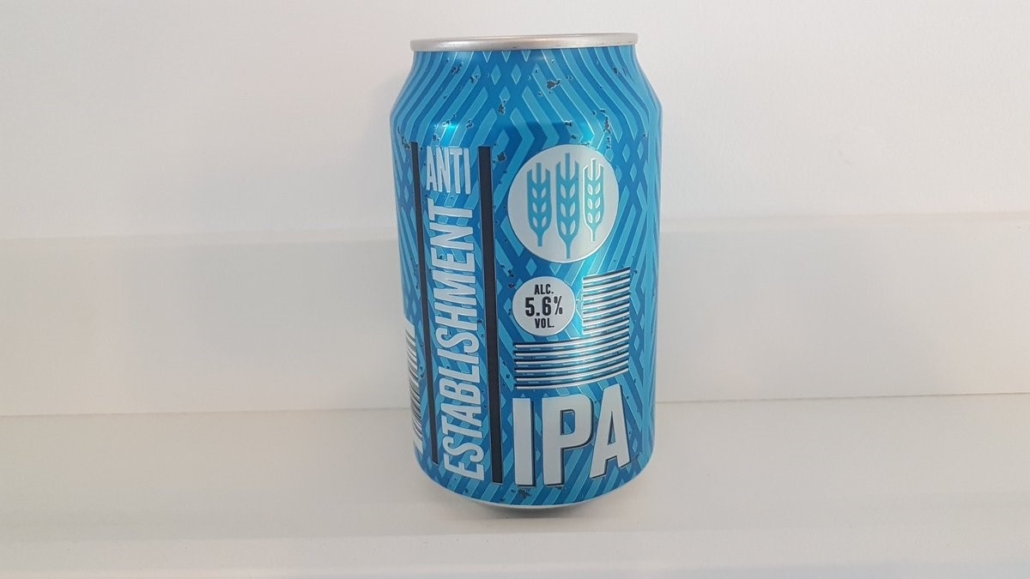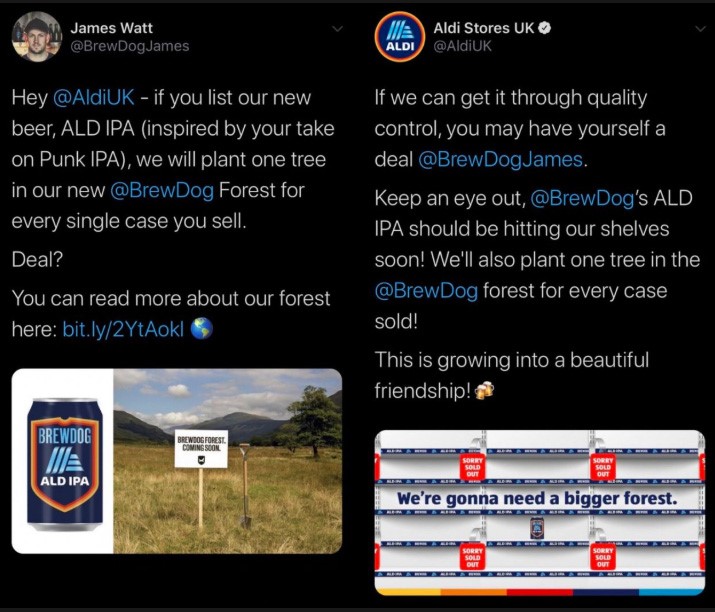BrewDog vs Aldi: A Corporate Partnership Formed on Twitter
In August 2020, Aldi announced the launch of a new range of beers called ‘Anti-Establishment IPA’. It comes in cans with branding that has more than a striking resemblance to BrewDog’s punk IPA beers. In the olden days before social media, BrewDog would have most likely sent behind-the-scenes legal letters to Aldi regarding copyright breach, and the public wouldn’t have had any knowledge or interest in the story.
But the world of marketing has changed. As all companies should know, social media is an open goal to get branding publicity from a story like this, especially if both companies can score good PR points and increase their profits.
In the case of BrewDog vs Aldi, how did they both use Twitter to capture the public’s attention and what positive publicity did the companies receive? Well, read on and we’ll explain.
A lightbulb moment in BrewDog HQ – James Watt
Once Aldi’s Anti-Establishment offering was brought to the BrewDog marketing team’s attention, it could have gone one of two ways. Take the serious route with legal action or embrace their lighthearted side and sense the business opportunities that could arise from it.
BrewDog already had experience with the former approach. In 2017, they initially started legal proceedings against Birmingham pub The Lone Wolf as BrewDog were launching a gin under the same name. BrewDog received criticism on social media and backed down, instead paying the pub’s legal fees and working with them on their own gin.
For the Aldi case, BrewDog clearly learnt their lesson. Knowing the capabilities Twitter has for snowballing stories thanks to retweets and trending topics, BrewDog founder James Watt showcased a homage beer to Aldi’s knock-off, naming it ‘ALD IPA’, with the beer’s logo as a mock Aldi badge. He offered a partnership to Aldi wherein the supermarket stocks ALD IPA, ensuring financial gain to BrewDog, whilst guaranteeing healthy sales for Aldi due to the Twitter notoriety surrounding the story.
Public platforms such as Twitter allow corporate businesses to be more personable. In the social media age, people aren’t going to be attracted to companies that take themselves too seriously with legal talk (this is of course sometimes necessary but should be done away from the public eye as much as possible). An incident like this which can financially work in both parties’ favour is the perfect chance to illustrate a company’s fun side.
However, the smartest bit of BrewDog’s strategy was the second half of the proposition…
Making Aldi an offer they can’t refuse
As part of the partnership, BrewDog committed to plant one tree (they’ve since increased to two) in their privately owned forest for every case Aldi sell. So, not only are BrewDog utilising the situation for personable and financial gain, they’re also joining in the fight against environmental damage, a key current social issue. In fact, the blogs on BrewDog’s website frequently discuss CO2 and the need to lower emissions. This offer was another way of displaying the BrewDog mission statement.
Aldi couldn’t exactly say no, or they’d risk bad press being seen not to care for environmental issues. But they went a step further, ensuring excellent publicity by matching BrewDog’s offer to also plant a tree for every case sold.
Caring for social issues has become critical for corporations in recent years. You will be a business with a heart, able to start communications with various environmental organisations, charities and social interest groups, increasing your network and your brand’s reach.
Social media is not only a great tool to get your business noticed, but if you use it right, it will allow you to turn a potentially tense situation into a beneficial one, and shows the public where how you fit into modern society.










